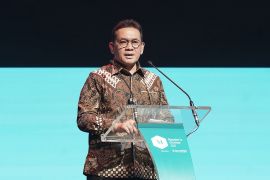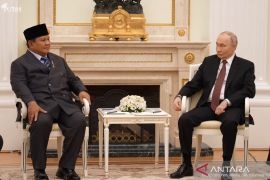The government`s determination to consistently implement the policy was reaffirmed by Trade Minister Gita Wirjawan amid calls by oil palm farmers that CPO export taxes should be cut.Jakarta (ANTARA News) - The Indonesian government will consistently implement its progressive crude palm oil (CPO) export taxes in an effort to boost the development of CPO downstream industry at home.
The government`s determination to consistently implement the policy was reaffirmed by Trade Minister Gita Wirjawan on Monday amid calls by oil palm farmers that CPO export taxes should be cut.
Farmers said the CPO export taxes of between 7.5 percent and 22.5 percent per metric ton would reduce their competitive edge in the face of Malaysia`s CPO in the world market. Malaysia has cut its CPO export taxes.
The Indonesian Oil Palm Farmers Association (Apkasindo) said the government should lower its export taxes. Tax cut is needed to maintain Indonesia`s CPO competitiveness against that of Malaysia.
Apkindo asked that the government should this year reduce CPO export tax to 4 percent only. At present, the government is imposing CPO taxes at a range of between 7.5 percent and 22.5 percent.
The 7.5 percent tax is imposed on CPO with a reference price of between 750 and 800 US dollars per ton. The highest level tax of 22.5 percent is imposed on CPO export with a reference price of over 1,250 US dollar per ton.
Fadhil Hasan, the executive director of the Indonesian Oil Palm Producers Association (Gapki), also urged the government to evaluate the CPO export taxes.
He said that the export taxes were no longer relevant as Indonesian exporters had to face competitors from Malaysia which had cut its export taxes. "If the government maintains the taxes at that level, we would not be able to compete with Malaysia`s next year," Fadhil said.
However, the government is consistently maintaining its policy of imposing the progressive export taxes. It hoped that with the policy, a balance between exports and downstream development would be achieved.
"We will consistently implement it and will not be affected by Malaysia`s step (to cut its CPO export taxes)," the minister said after attending a coordination meeting at the office of the chief economic minister here on Monday.
He said that Malaysia already had many different downstream industries but the number of industries in its upstream area was small. "So, they have the courage to cut their export taxes and exports their upstream products," he added.
Gita said that the government had the interest to develop the palm oil downstream industry so that it decided to raise CPO export taxes. "With the policy, we are convinced that a balance would be achieved between the downstream industry development and increase in palm oil product exports," the minister said.
The minister explained that Indonesia and Malaysia had very different interests with regard to CPO export taxes. The Malaysian decision to cut its CPO export taxes would not affect Indonesia`s CPO industry.
"We have to support the development of downstream CPO industry. The CPO export tax should be implemented consistently," the trade minister added.
Moreover, the Indonesian government hopes 70 percent of its crude palm oil production could be processed at home. "The target is 65 to 70 percent of production which could be processed at home this year," the director general of agro-industry, Benny Wachjudi, meanwhile said recently.
He said investment in the CPO processing industry has kept coming to increase refinery capacity. "Several years ago the refinery capacity only reached 50 percent but now it has jumped to 75-80 percent," he said.
He said that Indonesia would therefore consistently implement the progressive export tax system for plantation commodities to encourage development of downstream industries.
Following the implementation of the system, development of CPO downstream industries has risen and exports of CPO products have also increased unlike in Malaysia where its refinery capacity has dropped to between 30 and 40 percent only, according to Benny.
In 2011 Indonesia`s exports of CPO derivative products were recorded at 9,026 tons while CPO at 7,646 tons but in 2012 they respectively rose to 10,964 tons and 5,592 tons, he said.
The CPO industry had recorded a good performance in 2011 when palm oil production increased by 7.3 percent, reaching 23.5 million tons, of which 16.5 million tons were exported.
Now the price of CPO in the world market is at a low level although demand for this commodity is growing.
The CPO price in export markets is around US$835 per ton for delivery in February and March, the North Sumatra branch of the Indonesian Association of Palm oil Companies (Gapki) said.
Association secretary Timbas Prasad Ginting said the price on the domestic market is around Rp7,425 per kilogram. "The price is still low although demand is on the increase as a result of less successful harvest in a number of countries of soybean," Timbas said.
The CPO price is expected to increase with the rising demand but the Gapki did not hope for too much, he said. The economic crisis is still besetting Europe and the United States keeps the price fluctuating, he said.
Chairman of the Indonesian Palm Oil Council Derom Bangun said it is difficult to predict the trend of commodity market including CPO price amid the prevailing global condition.
He said that the CPO price should increase with the shrinking supply of that commodity and soybean in the world market. CPO supply is shrinking as harvest period has been over from August to November, 2012, but the price remains low.
"If the price did not improve until the end of the year, the average selling price this year would be lower than last year or would be low US$900 per ton," Deerom said.(*)
Reporter: Andi Abdussalam
Editor: Heru Purwanto
Copyright © ANTARA 2013











